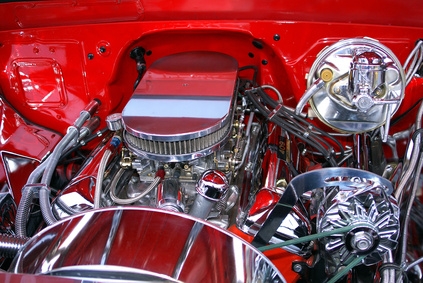
All internal combustion engines generate heat. This is one of the byproducts that the engine must remove to keep all the internal parts working. The heating up of an engine is cause by piston compression of the air/fuel mixture and combustion. The exhaust system allows the burned air/fuel mixture, and some of the heat, to escape from the engine. But not all the heat leaves the engine with the exhaust. The cylinder walls, the piston, the exhaust valve, and the exhaust manifold retains some of the heat.
The radiator is the engine component that dissipates the internal heat of the engine, by way of a 50/50 mixture of water and anti-freeze. The water mixture flows through the engine, and then through the coils of the radiator to cool the water back down; the process is continuous. The fan plays an important part of this process by pulling cool air through the radiator.
While the vehicle is stopped the fan pulls air through the radiator. At normal driving speeds the fan works very little because the movement of the vehicle is causing air to flow through the radiator. The fan shroud directs the air through the radiator.
The mixture of water and anti-freeze is important because anti-freeze has ingredients to help water dissipate heat faster. The coolant must be flowing through all the coils in the radiator for maximum efficiency. A partially clogged radiator can cause the engine to overheat, particularly at high engine rpm.
There are a few things to check when the vehicle runs cool at slow speed but runs hot at high speed on the interstate. First, check the radiator to ensure it is full of the 50/50 mixture, and that the overflow canister has the right amount of liquid. Second, check to see the fan shroud is not broken and is where it should be, (no gaps between the shroud and the radiator). Third, check the thermostat; it may not be opening all the way.
Take the vehicle to a radiator shop and have them pressure test it. While it is there it would be a good idea to have them also professionally flush the system. This will improve coolant flow at high speed.